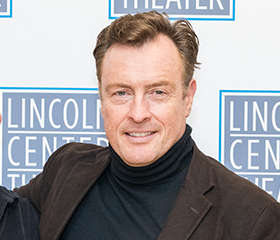Let us now praise Toby Stephens. Since rehearsals began in January he has played Corruption’s central character, Tom Watson, and however collaborative the production has been the fact remains that Stephens has been a primary motor in the running of this high-paced ensemble.
As the show heads into its final week, I was curious to know how Stephens has kept up the tempo for these many months. “It was terrifying at first,” he said. With a complicated new play, he added, “it’s not fully cooked” right away. “With the early previews you’re throwing it out there. And it’s like a hedge: it needs trimming.”
What’s more, Stephens said, “Corruption has a lot of scene changes, so it was always going to take a little time to get everything to flow.” He had done Oslo, the previous play by J.T. Rogers, in London, and even there, Stephens said, after Oslo had been worked out in New York, at LCT, “it was such a technical exercise. But no matter. With both Oslo and Corruption you’re dealing with really interesting subjects. And how lucky have I been to be doing a new play.”
That Corruption has been hurtling along so excitingly these past weeks has to do not just with Stephens but with everyone surrounding him. “We really have been a great group backstage,” he said. “A hard-working and happy cast.”
It is the director, Bartlett Sher, and playwright, J.T. Rogers, who set the tone for that atmosphere. “What’s so welcome about Bart and J.T.,” Stephens said, “is that they are very collaborative. You’re free to say, ‘Let’s try this,’ or “This isn’t working.’” He added, “It’s gratifying that they’re both very relentless. Somebody less relentless wouldn’t get results at this level. They keep at it until it's as good as it can possibly be. I appreciate their doggedness because I’m a bit like that myself.”
Stephens’ work ethic comes in part from his mother, the actress Maggie Smith. “As a boy, I remember her coming home from work and worrying about things – teasing little knots of performance until they were smoother. She would say, ‘There’s this bit that I can’t quite get,’ or, ‘I know there’s a laugh there but I haven’t got it yet.’ I was fascinated by that part of her process.”
With Corruption, Stephens has kept honing his Tom Watson character – another relentless type -- throughout the run. “He keeps up his crusade against the Murdoch empire,” Stephens said, “because he knows that what they’re doing is wrong. And he’s propelled by the damage they’ve done to his family.”
But Watson is not just defending his brood. “There’s a certain amount of vanity with any politician,” Stephens said, “and that drives him as well.” Watson also has a pragmatic side: he’s trying to interest the public in his anti-Murdoch campaign. “As a member of Parliament,” Stephens explained, “Tom Watson has to be extremely careful about what he says, to be in line with his party whips. He can’t just stand up and start spouting.”
Outside the House of Commons, Watson is freer. “He has to galvanize attention to the corruption, so he can attack and expose more,” Stephens said. “Otherwise, he’s pissing in the wind.” From an unprivileged background in northern England, Watson is also driven by class. “He hasn’t been born into any of the elites that run London and the U.K.,” Stephens said. “So he’s motivated by having to struggle to gain his place amongst the powerful.”
In this final part of the Corruption engagement, Stephens said he is motivated to portray Watson ever more clearly. “When you open, there’s a certain amount of hysterical energy underneath whatever you’re doing. After that, you can calm down a bit and try to get better.” He added, “There’s always a point I get to with plays, where I say to myself: If only I could have got here so much earlier. But of course you can’t, because it takes a certain amount of repetition, and building your confidence, to arrive anywhere close to where you want to be. So you keep going.”
Brendan Lemon is a freelance journalist in New York.
